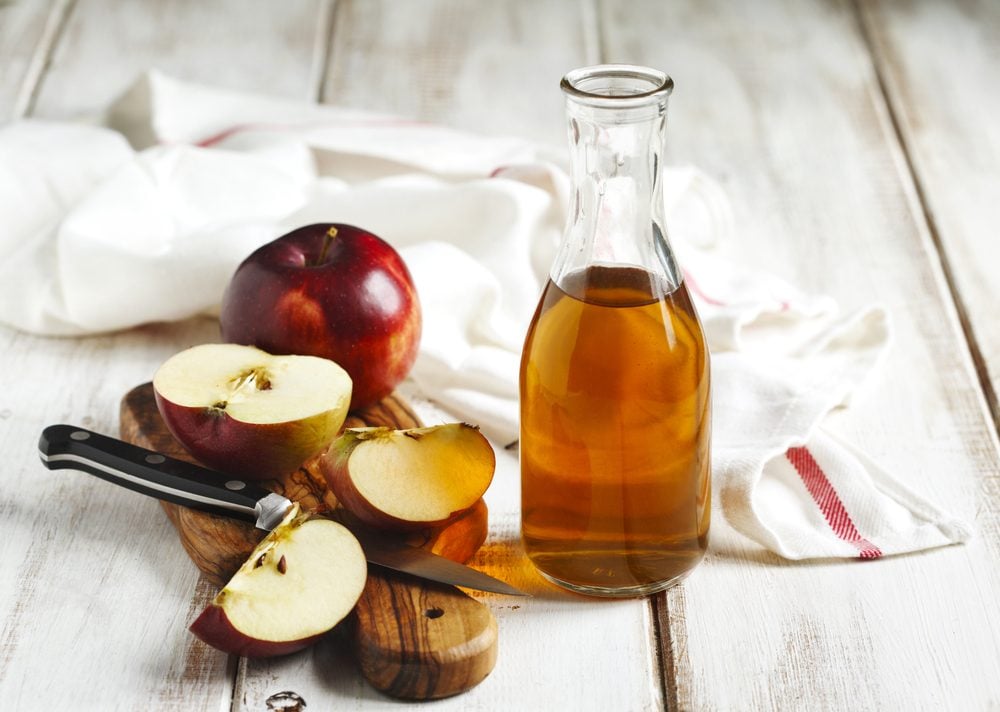Take swigs of it
 MICHELLE LEE PHOTOGRAPHY/SHUTTERSTOCK
MICHELLE LEE PHOTOGRAPHY/SHUTTERSTOCK
Even when it’s diluted, apple cider vinegar is still an extremely acidic substance. Caitlin Hoff, a health and safety investigator for ConsumerSafety.org, says that ACV is highly acidic and as such, can damage tooth enamel. So, if you’re wondering how to take apple cider vinegar, don’t just sip it or swig it from a glass (even diluted). Instead, try drinking it through a straw so that it comes into as little contact as possible with your choppers. Abel recommends avoiding brushing your teeth for at least 30 minutes after taking apple cider vinegar.
Start by drinking lots of it
 AFRICA STUDIO/SHUTTERSTOCK
AFRICA STUDIO/SHUTTERSTOCK
Apple cider vinegar is good for you; here are the 11 things that happen to your body when you drink apple cider vinegar every day. So, the more the better, right? Wrong. Too much of a good thing is usually a problem—and apple cider vinegar is no exception. Especially if you’re new to ACV, you should make sure you’re not taking too much of it. “It’s a good idea to ease into it,” says Abel. This will help you gauge how your body reacts to it. “If it gives you an upset stomach or a burning feeling, reduce the amount until there’s no sensation,” Abel suggests. Plus, starting small and working your way up to a larger amount will allow you to adjust to the taste. Even if all goes smoothly and you experience no issues, you should never go beyond two tablespoons at a time. “Even when you dilute it in water, limit your intake to two tablespoons to protect yourself against harmful or uncomfortable side effects,” Hoff advises.
Drink it right before bed
 POCKAKPHOTOGRAPHER/SHUTTERSTOCK
POCKAKPHOTOGRAPHER/SHUTTERSTOCK
While taking apple cider vinegar before you eat is a good idea, taking it before you sleep is not. “Taking ACV immediately before bed is not advised because of the potential for it to creep back up the esophagus,” says Laura C. Stix, a naturopathic doctor and clinical hypnotherapist. Even if the ACV is diluted, it can still harm your esophagus if the acid comes into contact with it while you’re lying down. “Regardless of the time of day, people should remain upright for 30 minutes after taking it to ensure there is no reflux and irritation to the esophagus,” Stix adds. She recommends drinking ACV at least half an hour before you hit the hay.
Take it if you have H. pylori
 9DREAM STUDIO/SHUTTERSTOCK
9DREAM STUDIO/SHUTTERSTOCK
While apple cider vinegar can, for the most part, boost your digestive health, there are some stomach conditions that this acidic substance will only make worse. One example is if you have Helicobacter pylori, the type of bacteria linked to ulcers. Unfortunately, apple cider vinegar (and the acid it contains) can cause even more irritation, warns Abel. If you have any doubts about drinking ACV—regardless of the reason—consult your doctor beforehand. Be sure to also look out for these 11 myths about apple cider vinegar you need to stop believing.
Put it directly on your skin
 MADELEINE STEINBACH/SHUTTERSTOCK
MADELEINE STEINBACH/SHUTTERSTOCK
Taking apple cider vinegar for your skin doesn’t always involve drinking. You can use ACV for its beauty benefits. It may help banish acne and dandruff or even ease a sunburn. But there’s a right and a wrong way to use ACV on your skin. “Whether you’re using ACV as a toner, to remove blemishes, or to treat infections, it’s crucial that you dilute it and minimize the contact with your skin,” says New York City resident Caleb Backe, a certified personal trainer and a health and wellness expert for Maple Holistics. “Prolonged exposure to the highly acidic vinegar can actually kill skin cells, erode your skin, and even leave you with semi-permanent chemical burns.” Again, sticking to one part vinegar to eight or ten parts water is the recommended amount.








No comments:
Post a Comment